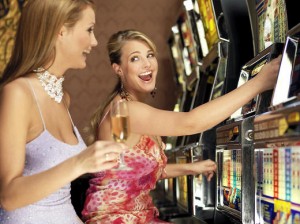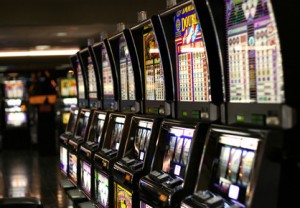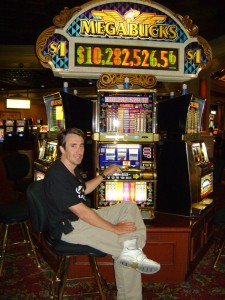 Most people know that the odds of winning in a casino are not in their favor. The house always has an edge. Depending on the game you play, that edge can be quite large. While you may enjoy the game and even be entertained by it, the odds of winning are very much in the favor of the casino. There are ways to minimize this potential loss. Take advantage of free play, free meals and rooms and certainly the free drinks that may be served. Above all enjoy yourself and do not gamble more than you can afford. The following is a direct quotation from Casino City times and written by Arron Todd.
Most people know that the odds of winning in a casino are not in their favor. The house always has an edge. Depending on the game you play, that edge can be quite large. While you may enjoy the game and even be entertained by it, the odds of winning are very much in the favor of the casino. There are ways to minimize this potential loss. Take advantage of free play, free meals and rooms and certainly the free drinks that may be served. Above all enjoy yourself and do not gamble more than you can afford. The following is a direct quotation from Casino City times and written by Arron Todd.
Best Odds of Winning in a Casino
1. Full Pay Deuces Wild Video Poker – Player edge of 0.77%
Yes, you read that right. There is a casino game that offers the player a small edge, when played optimally. The game is played remarkably differently than Jack or Better, so make sure you know the optimal strategy when you play. And just like Jacks or Better, make sure the paytable is to your advantage. If you can find a machine that’s paying natural royals at 800-to-1, four deuces at 200-to-1, wild royals at 25-to-1, five of a kind at 15-to-1, straight flushes at 9-to-1, four of a kind at 5-to-1, full houses at 3-to-1, straights and flushes at 2-to-1, and three of a kind at 1-to-1, you’ll make more money than you’ll lose over the long haul, if you play it right.
2. Blackjack – House edge of 0.28%
Blackjack has the lowest house edge of any game in the casino, with a few caveats. The 0.28 percent house edge assumes the most liberal of house rules, including rarely seen rules such as the dealer standing on soft 17 and late surrender. To determine the exact house edge in the game you’re playing visit the Wizard of Odds’
The house edge also assumes a perfect basic strategy. If you plan on hitting the blackjack tables during your next visit to the casino, try to memorize it to maximize your play.
3. Spanish 21 – House edge of 0.4%
Spanish 21 is a variant of blackjack, played with decks of 48 cards (10s are removed). The game can get a little crazy, because you can double down on any number of cards, surrender after doubling, and five, six, and seven-or-more card 21s are paid at 3-to-2, 2-to-1, and 3-to-1, respectively. The house edge for this game is low because it has a much more complex basic strategy than blackjack. But if you can master all the intricacies of the game, Spanish 21 can be a lot of fun and offer an exciting alternative to standard blackjack.
4. Jack or Better Video Poker – House edge of 0.46%
There are two key factors in making a 0.46 percent house edge a reality on a Jacks of Better video poker machine. The first factor involves finding the right machine. If you find a Jacks or Better machine paying 9-to-1 on a full house and 6-to-1 on a flush, you’ve probably found a full pay machine. The second involves learning an optimal strategy. If you plan on playing video poker on your next trip to the casino, make sure you know the right strategy and practice before you go.
5. Catch a Wave – House edge of 0.5%
Not sure if you can still find this game anywhere anymore, but it’s a favorite at the Casino City Home Poker Game, where a version of it is usually played in tournament style format between the cash game and the tournament. In this game, a player is dealt a card and must guess if the next card will be higher or lower. If the player guesses right six consecutive times, he is paid 6-to-1. He may also stand at any point (the player automatically loses his wager if he’s wrong, similar to busting in blackjack), at which the dealer will play out a hand in the same manner, but according to house rules. If the player’s “wave” is longer than the dealer, the player wins.
6. Baccarat (Banker) – House edge of 1.06%
Baccarat gets two-in-a-row on our list of best casino bets, as the Banker bet slightly eclipses the house bet with a house edge slightly over one percent. At a big high-limit table, the shoe travels from player to player, and the “dealer” makes the Banker bet and the rest of the table bets on the Player (though players have the option to make any bet they please). At a mini baccarat table, the casino provides the dealer.
7. Baccarat (Player) – House edge of 1.24%
The favorite game of James Bond (at least the Sean Connery and Roger Moore versions), baccarat is a game of tradition and ritual. The only real choice made is whether to bet on the player, the banker or the tie. Don’t bet the tie; a whopping 14.36 percent house edge keeps it off this list. The player bet has a respectable 1.24 percent house edge.
8. Craps (Don’t Pass/Don’t Come) – House edge of 1.36%
Also known as the “dark side,” betting on the Don’t Pass line is the opposite of betting the Pass line and is considered somewhat taboo at a craps table. Basically you’re betting that the shooter will fail. Even though it may be taboo, it comes at a slightly smaller price than betting on the pass line.
9. Craps (Pass/Come) – House edge of 1.41%
When you bet the pass line in craps, you’re betting that the shooter’s first roll will be a seven or 11 and not a two, three or 12. If it’s any other number, your bet stands and now you’re betting that the shooter will hit that “point” number again before a seven is rolled. The house edge is very small, just 1.41 percent.
10. Pai Gow Poker – House edge of 1.46%
In Pai Gow Poker, players are dealt seven cards and split them up into two hands, one with five cards and one with two cards. The five-card hand must have a higher poker rank than the two-card hand. The players’ hands are compared to the dealer’s hand, and if the player wins both, he wins the bet. If the player wins one but loses another, it’s a push, and if the dealer wins both, the player loses. The house gets the edge by taking a five-percent commission on all winning bets and winning all hands that push (e.g., your two-card ace-queen loses to the dealer’s ace-queen). You can reduce the house edge by banking, which means that your hand will win in pushes. Each player will be given an opportunity to bank in turn, should they choose to do so, in rotation with the dealer.
Worst Odds of Winning in a Casino
1. Craps (3, 11 and all easy hops; hard 4, 10; any craps) — House edge of 11.11%
If you’re not a craps player but have walked by a table and seen the number of chips in play and the excitement surrounding it, it’s no surprise that the game has an array of different betting options. In fact, of the hundred or so bets you can make on the craps table, two of them are included in our previously mentioned article that lists the 10 lowest house edge casino bets.
But there are certain bets a craps player should try to avoid, and these are three of them. Stay tuned for a few more that are even more lethal.
2. Craps (2, 12 and all hard hops) — House edge of 13.89%
OK, now that we’ve got all of the non-craps players out there intrigued, we should follow through and mention that Casino City is fortunate enough to have one of the game’s most notable authorities, Frank Scoblete, as a regular Gaming Guru contributor. And, coincidentally, Frank’s most recent column touches on why craps is so exciting. Be sure to check it out.
3. Baccarat (tie) — House edge of 14.36%
The volatile card game was first introduced in Europe over 500 years ago and is played between two hands— one by the “player” and one by the “banker.” It gained fame as the favorite game of the early James Bond movies, and more recently as a game that poker pro Phil Ivey was accused of “edge sorting,” and it’s popular with high rollers.
Baccarat wagers on the player and the bank found their way onto the list of our 10 lowest house edge casino bets at 1.24%, but when you bet on a “tie,” that number soars.
4. Slot machines — House edge can be as high as 15%
Slot machines generate the most revenue for a casino, and with such a wide array of games available, the house edges vary and can be as low as 3%. But there are plenty of games out there that carry a house edge in the range of 15%. Combine that with the hyper-fast rate of play, and you’ve got yourself a recipe for disaster.
5. Big Six — House edge between 16%-24%
There’s not a casino game much simpler — or more dangerous to your bankroll — as Big Six, often called Wheel of Fortune, Money Wheel or Big Wheel.
There are a number of variants, but the most common features a big wheel (see, it’s even got a real clever name) with $1, $2, $5, $10 and $20 bill symbols, as well as a joker and some other “wildcard” symbol, like a casino logo. You bet on which symbol the wheel will land on with the payout odds match the dollar amounts (2-to-1 on $2, 5-to-1 on $5, etc.) while the other non-numerical symbols cashing in at as much as 45-to-1.
The lowest house edge bets you can make is on $1 (11.11%), while the $5 and $20 bets come in with a whopping 22.22% with wager on the joker/logo bets increasing to 24.07%.
In other words, if you see the big wheel on the horizon in the casino, run the other way . . . fast!
6. Craps (any seven) — House edge between 16.67%
Craps rears its ugly head once again on the list. When the shooter rolls a seven at the craps table it can be a pivotal moment, and while betting any seven will be thrown pays a tidy 5-to-1, it’s one of the worst wagers you can make.
7. Casino War (tie) — House edge of 18.651%
If you’re like me, War was one of the first card games you played as a kid. But when I was flipping cards with my cousins on my living room floor 40 years ago, I never envisioned playing it in a casino. And judging from the house edge numbers, if I ever do, betting the tie is not recommended.
The typical Casino War game is played with six decks, and that’s when the house edge is 18.65%. The fewer cards used in the game, the higher that number goes. For instance, when using one deck, the house edge on a tie is 35.29%. The lesson? Keep your memories of playing War to when you were a child, not an adult in a casino.
8. Bonus Six (with insurance) — House edge of 23.83%
Bonus Six is a five-card stud-based game. A player can buy the insurance and then get the option to buy a sixth card.
The problem with doing that is that the house edge more than doubles. Rising from 10.42% without insurance to almost 24%. No thanks.
9. Keno — House edge of between 25% to 29%
You don’t have to be inside the walls of a casino to play keno. Heck, Massachusetts, the home of Casino City, is far from Nevada or Pennsylvania. But when it comes to a number of casinos, they are the proud Keno capital of the world. Terminals and screens with bouncing balls in that seem to be in every convenience store or bar you go into. The Bay State generated $900 million in Keno sales last fiscal year. Which accounts for an eye-popping one-quarter of all sales in the U.S.
That $900 million number isn’t so surprising when you consider the house – which in Massachusetts’ case is the government – edge is nearly 30%.
10. Sic Bo — House edge of 33.3%
Another game where the house edge varies wildly depending on the bet. Sic Bo, which means “dice pair,” can get quite expensive on certain wagers.
While the safest bet on the table is Small/Big, which carries a house edge of 2.78%. There are numerous others than run into the range of over 30%. Aa number so frighteningly high they should come with a Surgeon General’s warning.
This post was reposted from Casino City Times and written by Arron Todd


